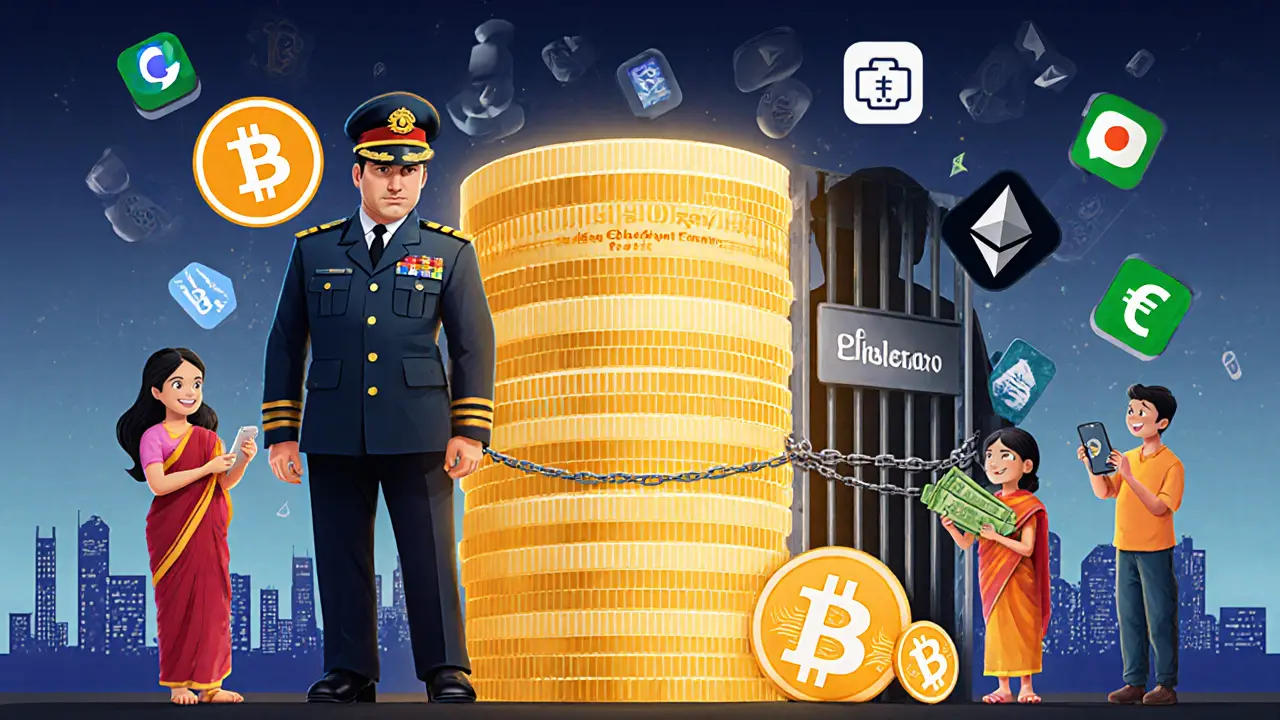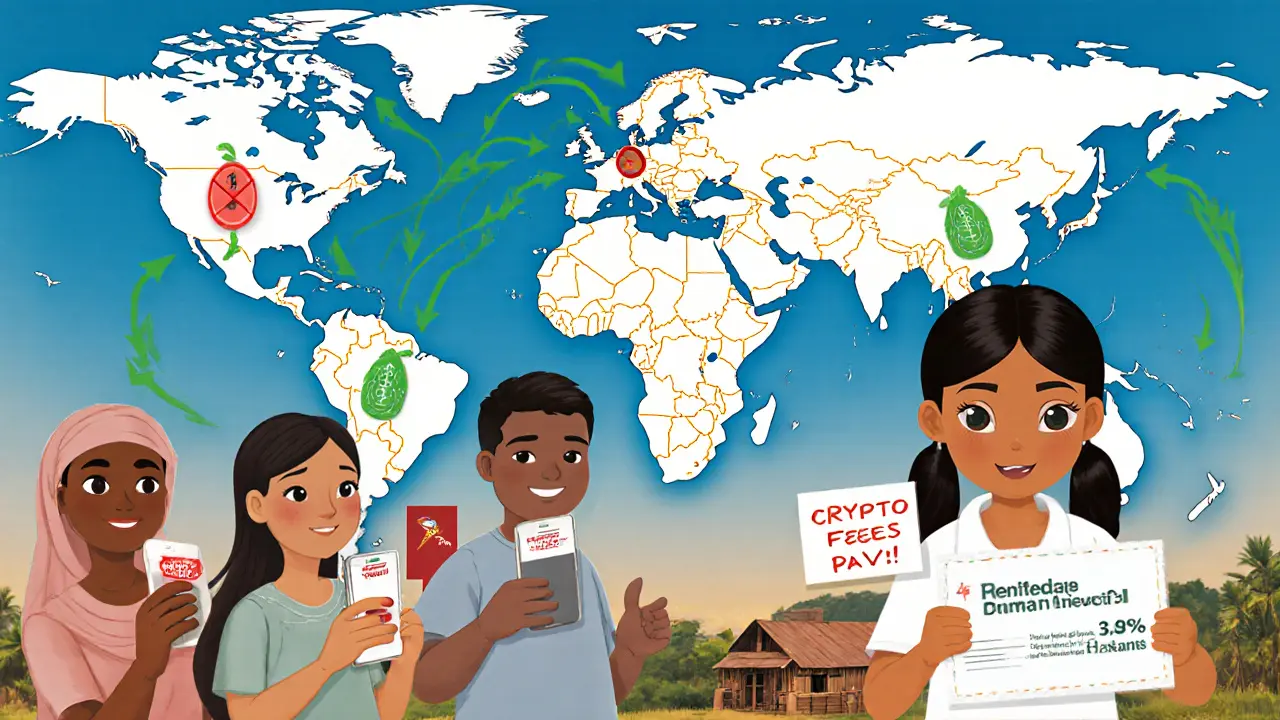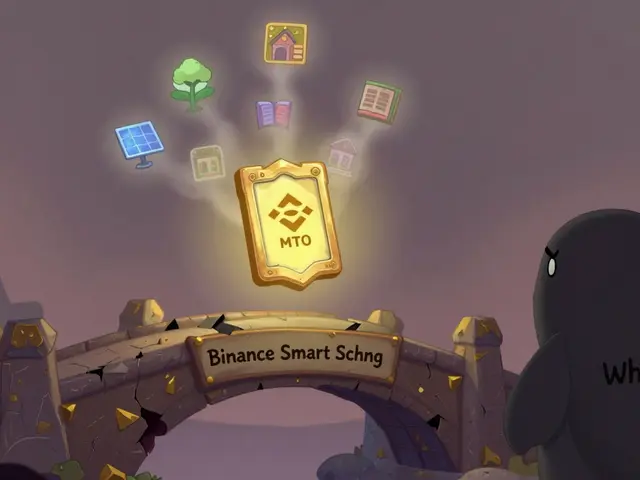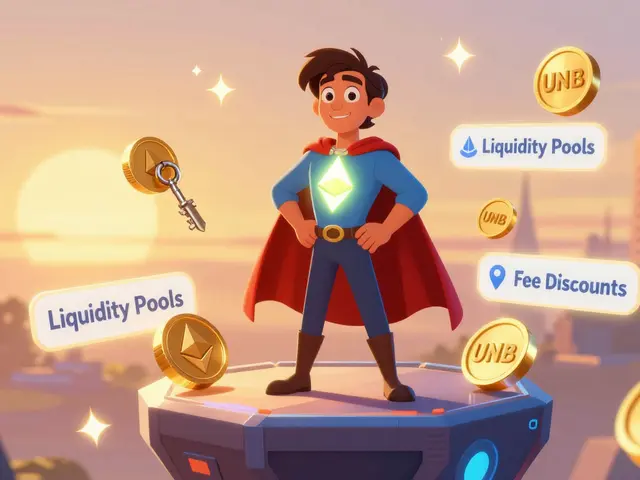Remittance Fee Calculator
Calculate Your Remittance Fees
Results
bKash
Market Share: 15.2%
Fee Range: 4.5%–6%
Nagad
Market Share: 11.8%
Fee Range: 4.2%–5.8%
Remittance Direct
New Government App
Fee: 3.8%
Western Union
Market Share: 9.1%
Fee Range: 6%–7.5%
Remittances in Bangladesh Are at an All-Time High - But Crypto Is Still Illegal
In 2025, Bangladesh received $30 billion in remittances - the most ever in its history. That’s more than the country made from exporting ready-made garments. Millions of Bangladeshi workers abroad - in Saudi Arabia, the UAE, Malaysia, and the U.S. - are sending money home, and for the first time, nearly all of it is flowing through official banks and mobile apps like bKash and Nagad. This isn’t just good news for families. It’s stabilizing the national economy, boosting foreign reserves to $25.6 billion, and turning a $4.3 billion deficit into a $3.3 billion surplus.
But here’s the twist: while remittances are booming, using Bitcoin, Ethereum, or any other cryptocurrency to send money to Bangladesh is still a criminal offense. The central bank, Bangladesh Bank, has banned crypto for remittances since 2017. And in September 2025, they issued a new warning: any company caught helping people send crypto to Bangladesh faces license revocation and possible jail time.
Why Did Remittances Surge So Fast?
The jump from $23.7 billion in FY2024 to $30 billion in FY2025 didn’t happen by accident. Three things changed:
- Exchange rates got fairer. Before, the official exchange rate didn’t match what people actually got in the market. Now, banks offer rates close to the open market, so workers don’t lose 10% just to send money home.
- The hundi network collapsed. Hundi was the old, informal system - cash handed off through middlemen, no paper trail. It was fast, but risky. After political changes in 2024, enforcement cracked down hard. Workers who used hundi started switching to banks because the new system became faster and safer.
- Mobile money took over. bKash and Nagad now handle 87% of all remittances. A worker in Dubai can send $500 via an app, and the family in Sylhet gets it in under 12 hours. No paperwork. No waiting days.
The result? Remittance processing time dropped from 3 days to under 4 hours for most transactions. The central bank’s systems now run 98.7% of the time - almost flawless.
Why Can’t People Use Crypto Instead?
It’s a fair question. In India and Pakistan, crypto remittances are being tested. In Nigeria, people use USDT to bypass currency controls. Why not Bangladesh?
The central bank’s answer is simple: too risky.
Crypto is anonymous. It moves fast. It can’t be tracked. Bangladesh Bank fears that if crypto became legal for remittances, it could:
- Undermine control over the taka (Bangladesh’s currency)
- Enable money laundering and tax evasion
- Let criminals hide money from regulators
- Trigger capital flight - people moving savings out of the country
Deputy Governor Ahmed Munas said it bluntly in September 2025: “Cryptocurrencies pose unacceptable risks to monetary sovereignty and financial stability.”
They’re not ignoring crypto entirely. Bangladesh Bank is studying Central Bank Digital Currencies (CBDCs) - a government-controlled digital taka. But private crypto? No. Not now. Not soon.

How Much Are People Really Paying to Send Money Home?
Even with all the progress, sending money home still costs too much.
The World Bank says the average fee for sending $200 to Bangladesh is 6.5%. That’s more than double the global target of 3%. In some cases, people pay up to 7% - especially from the UK or the U.S.
Here’s what that means in real terms:
- Send $500? You pay $35 in fees.
- Send $1,000? You pay $65.
That’s not just money lost. It’s money that could go to school fees, medical bills, or a new roof.
There’s one bright spot: the new “Remittance Direct” app from Bangladesh Bank charges only 3.8% - below the market average. But adoption is still low. Most people stick with bKash, Western Union, or MoneyGram because they know how to use them.
What Do Real People Say?
Reddit and Facebook groups are full of stories.
One user, DhakaDave1987, said: “My brother sent $800 from Dubai using bKash. It arrived in 12 hours. No calls. No forms. Just cash in his account.”
But another, SylhetiAbroad, complained: “I paid 7% to send $1,000 from London. The bank said the rate was 112 taka to the dollar. The next day, the open market rate was 118. I lost $60 just because of the delay.”
And then there’s ChittagongMigrant, who lost $300 in fees and waited 10 days to send $500 from Malaysia. “I thought I was using a reliable service,” he wrote. “Turns out, they lost my paperwork.”
On Facebook, a group of 587,000 Bangladeshi expats found that 63% are frustrated with the system. But only 12% have tried crypto - and most of them quit after hearing about the legal risks.

Who’s Winning in the Remittance Game?
It’s not just the banks. It’s the apps.
Here’s who controls the market as of Q3 2025:
| Provider | Market Share | Primary Channel | Fee Range |
|---|---|---|---|
| Sonali Bank | 18.7% | Bank transfer | 5.5%-7% |
| bKash | 15.2% | Mobile app | 4.5%-6% |
| BRAC Bank | 12.4% | Mobile + agent network | 4%-5.5% |
| Nagad | 11.8% | Mobile app | 4.2%-5.8% |
| Western Union | 9.1% | Agent locations | 6%-7.5% |
bKash and Nagad are winning because they’re fast, cheap, and easy. You don’t need a bank account. You just need a phone and a National ID. The app works even on basic Android phones.
But here’s the catch: 18% of rural recipients still can’t access digital services. They need someone to go to a bank or agent for them. That’s a problem Bangladesh Bank hasn’t solved yet.
What’s Next for Bangladesh’s Remittance System?
The government has big plans:
- 95% digital remittances by 2027 - no more paper forms.
- Integration with India’s UPI - by mid-2026, workers in India can send money directly to Bangladeshi phones.
- CBDC pilot - a government digital taka is being tested, but it’s not for crypto.
But experts warn: growth might stall. Dr. Birupaksha Paul from Jadavpur University says, “Without lowering fees and reaching the last mile, remittances could plateau at $33-35 billion.”
And crypto? Don’t expect a change anytime soon. Even as global markets move toward digital assets, Bangladesh Bank’s message is clear: “Crypto has no place in Bangladesh’s remittance ecosystem for the foreseeable future.”
Why This Matters Beyond Bangladesh
Bangladesh is proving something important: you don’t need crypto to fix remittances.
You need:
- Good exchange rates
- Fast, mobile-first systems
- Strong enforcement against illegal channels
- Trust in the system
Other countries with high remittance flows - like the Philippines, Egypt, and Mexico - are watching closely. If Bangladesh can bring fees down to 3% while keeping crypto out, it could become a global model for how to do remittances right - without the chaos of unregulated digital currencies.
For now, the answer isn’t Bitcoin. It’s bKash. It’s Nagad. It’s a phone, a National ID, and a government that finally got its act together.
Is it legal to send cryptocurrency to Bangladesh?
No. Sending or receiving cryptocurrency for remittances is illegal in Bangladesh. The central bank, Bangladesh Bank, banned all private crypto transactions in 2017 under the Foreign Exchange Regulation Act. In September 2025, they reinforced this with a warning that any financial service provider facilitating crypto remittances risks license revocation and criminal prosecution.
Why is Bangladesh banning crypto but allowing mobile money like bKash?
bKash and Nagad are government-regulated, fully traceable, and tied to real identities. Every transaction is recorded with the user’s National ID and phone number. Crypto is anonymous and untraceable. Bangladesh Bank can monitor and control mobile money - they can’t do that with Bitcoin or USDT. That’s why mobile money is encouraged, and crypto is banned.
How much do people pay to send money to Bangladesh?
The average fee is 6.5% for sending $200, according to the World Bank. That’s much higher than the global target of 3%. Some services like bKash charge 4.5-6%, while Western Union can hit 7%. The new Remittance Direct app from Bangladesh Bank charges only 3.8%, but it’s not yet widely used.
Can I use Bitcoin to send money to my family in Bangladesh?
Technically, you could try - but it’s risky and illegal. If you send Bitcoin to a friend in Bangladesh, they’d have to convert it to cash through an underground exchange. That’s how money laundering happens. Bangladesh Bank actively monitors for this. If caught, both sender and receiver could face legal action. It’s not worth the risk.
What’s the future of remittances in Bangladesh?
The future is fully digital. By 2027, 95% of remittances are expected to be sent via apps or bank systems. Bangladesh Bank is working with India to link up with UPI, so workers there can send money instantly. A government digital currency (CBDC) is also in testing. But crypto won’t be part of it. The goal is to make remittances cheaper, faster, and safer - without giving up control of the financial system.






Chris G
Bangladesh got it right. No crypto needed. Mobile money works faster, cheaper, and the government can actually track it. Crypto is just a tax evasion tool disguised as innovation.
Phil Taylor
Of course they banned it. Western banks and IMF types would lose control if people started bypassing their fee-rigged systems. This isn't about stability-it's about power. And Bangladesh's government is finally standing up to it.
diljit singh
bKash is king. No capes. No blockchain. Just a phone and a PIN. Why overcomplicate what already works? Crypto bros in Silicon Valley have no idea how real people live.
Abhishek Anand
The real revolution isn't in the tech-it's in the trust. People trust bKash because it's tied to their ID, their community, their reality. Crypto offers anonymity but steals dignity. You don't need to hide when the system works for you.
vinay kumar
6.5% fee is still robbery. Why not just legalize crypto and let the market drop it to 1%? The central bank is scared of losing control not because of crime but because they're bad at innovation
Lara Ross
This is a MASTERCLASS in financial inclusion. Look at how they leveraged existing infrastructure, prioritized accessibility, and refused to chase shiny objects. This model should be taught in every economics program worldwide.
Leisa Mason
They're not winning. They're just avoiding the inevitable. Crypto is decentralized. This system is just another centralized monopoly with a better UI. The fees are still obscene and the control is still authoritarian.
Rob Sutherland
It's funny how we think innovation means more tech. Sometimes it means less. Less complexity. Less intermediaries. Less fear. Bangladesh didn't invent anything new-they just stopped overengineering what already worked.
Tim Lynch
Imagine if we treated money like we treat love-simple, direct, human. No middlemen. No ledgers. Just trust. That's what bKash is. Not a payment app. A lifeline. A quiet revolution in a billion pockets.
Melina Lane
My cousin in Dhaka uses Nagad every week. She doesn't know what blockchain is. She just knows her mom gets the money before lunch. That's all that matters. Keep it simple. Keep it human.
Lani Manalansan
This is what happens when a country listens to its people instead of Wall Street. The diaspora didn't ask for crypto. They asked for speed. For certainty. For dignity. Bangladesh gave it to them. That's leadership.
Frank Verhelst
This is why I love this country. 🇧🇩 No hype. No crypto bros. Just real solutions for real people. bKash > Bitcoin any day. 10/10 would send money again.
Roshan Varghese
They banned crypto because they're scared the people will figure out the taka is worthless. This whole system is a pyramid scheme disguised as progress. Wait till the CBDC rolls out and you see the surveillance state in action
Dexter Guarujá
Crypto is a tool for criminals. Mobile money is a tool for families. There's no moral equivalence here. If you think Bangladesh is wrong for protecting its citizens from financial chaos, you're not progressive-you're naive.
Jennifer Corley
The real story is the 18% of rural recipients who still can't access digital services. This isn't progress-it's exclusion with better branding. They're just replacing hundi with app-based marginalization.
Natalie Reichstein
They call it progress but it's just control. Every transaction tracked. Every ID linked. Every movement monitored. You think you're getting convenience but you're giving up your financial privacy. This isn't a win-it's surrender.
Kaitlyn Boone
6.5% fee? That's a joke. Why not just let people use USDT? The government's fear is not crime-it's losing revenue. They'd rather take 6.5% than let the market drop it to 0.5%
James Edwin
What's interesting is how this mirrors the rise of UPI in India. It's not about the tech-it's about integration. If Bangladesh can link with UPI, they'll create the largest seamless remittance corridor in South Asia.
LaTanya Orr
The real hero here is the National ID system. Without it, none of this works. It's not bKash or Nagad that made the difference-it's the government finally making sure everyone had a digital identity. That's the quiet foundation of everything
Ashley Finlert
This is the most elegant economic policy I've seen in a decade. It rejects ideological extremism-both crypto utopianism and state control absolutism-and forges a pragmatic, human-centered path. Bangladesh isn't just solving remittances. It's redefining financial sovereignty.
Chris Popovec
CBDC? That's just the next phase of financial fascism. They're building a digital leash. Every taka will be programmable. You'll need government approval to buy rice. This isn't innovation-it's the surveillance state with a mobile app
Marilyn Manriquez
This is what inclusive growth looks like. Not subsidies. Not bailouts. Not crypto. Just reliable infrastructure, clear rules, and respect for the dignity of everyday people. Bangladesh deserves global recognition for this.
taliyah trice
People just want their money. Not crypto. Not apps. Just cash in their hands. The system works. Don't fix what ain't broke.
Charan Kumar
In India we have UPI and still people use hundi in villages. So dont think Bangladesh solved everything. The real problem is trust in banks. Not tech
Peter Mendola
6.5% is unacceptable. Crypto is the only viable path to sub-1% fees. This is a failed policy disguised as stability. The central bank is protecting its own monopoly, not the people.